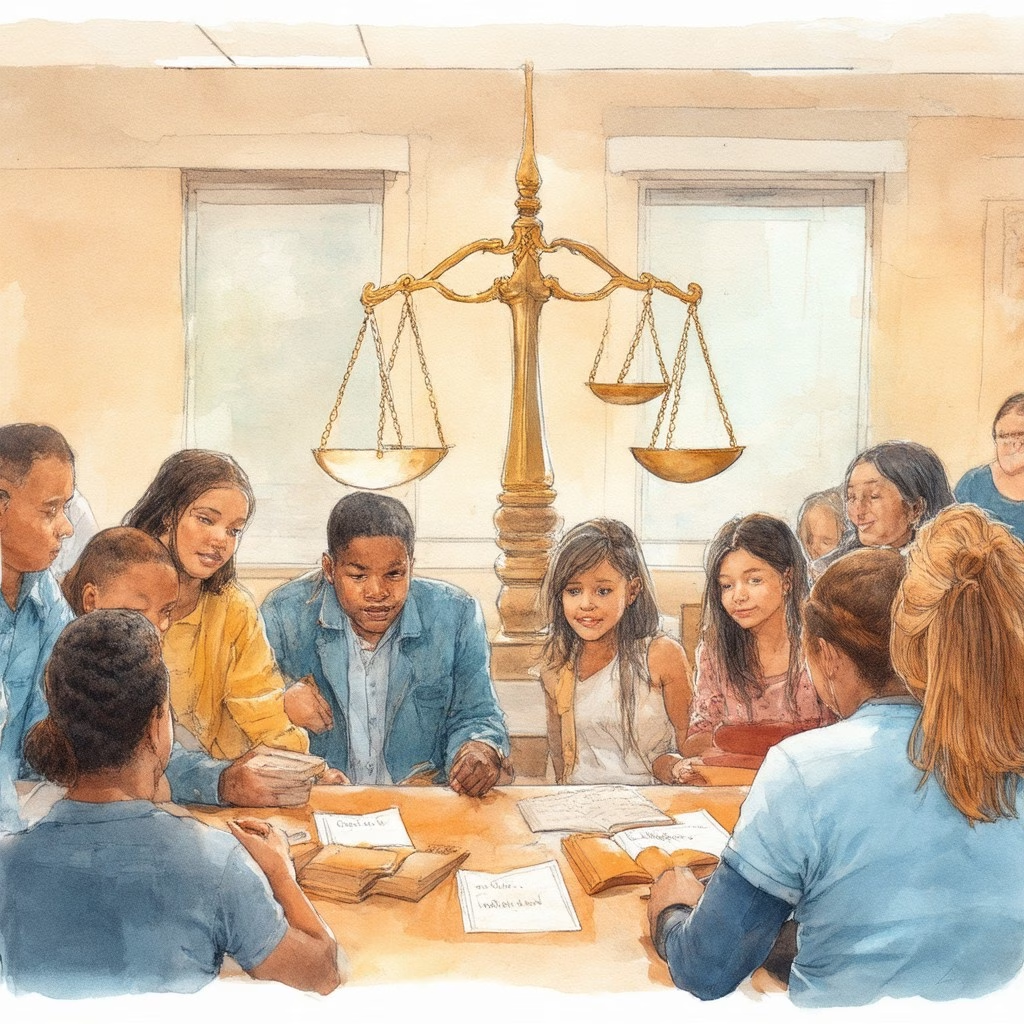Key Takeaways
- Access free legal services through local legal aid offices, pro bono programs, and law school clinics to receive essential legal support.
- Consulting with a lawyer for free can provide expert guidance and help you understand your legal rights and options.
- Low-income families can benefit from free lawyers available in various states, including tailored resources for specific legal issues.
- Utilizing legal assistance free programs can significantly reduce stress by connecting you with professional legal support.
- Many online platforms offer legal services online, making it easier to access help from the comfort of your home.
In today’s complex legal landscape, many individuals and families find themselves in need of assistance but are unsure where to turn. If you’re looking to find legal help, you’re not alone. This article will guide you through the essential resources available for accessing free legal services and how to consult with a lawyer for free. We will explore the various options for low-income families, including income guidelines for legal aid, and the availability of free lawyers for low-income families across different states, such as Vermont and Texas. Additionally, we will discuss the benefits of utilizing legal assistance free programs and how to access legal services online. Whether you’re seeking law advice free or need help navigating the legal system, this comprehensive guide will provide you with the insights and tools necessary to get the legal support you need. Join us as we delve into the world of legal help services and uncover the pathways to affordable legal assistance.
Understanding Free Legal Services
Accessing legal assistance can often feel daunting, especially when financial constraints come into play. Fortunately, there are numerous avenues to find legal help without incurring costs. Understanding the various options available for free legal services can empower you to navigate your legal challenges effectively.
What Are the Options to Consult with a Lawyer for Free?
To talk to a US lawyer for free, consider the following options:
- Legal Aid: Federally funded legal services offices offer assistance to low-income individuals facing legal issues. These organizations employ attorneys who specialize in various areas of law, ensuring that you receive expert guidance. You can find local legal aid offices through the Legal Services Corporation (LSC) website.
- Pro Bono Services: Many lawyers volunteer their time to provide free legal services to those in need. Pro bono programs connect low-income clients with these volunteer attorneys. You can search for pro bono opportunities through state bar associations or organizations like the American Bar Association (ABA).
- Free Legal Answers: The ABA also offers a platform called “Free Legal Answers,” where individuals can post legal questions and receive answers from volunteer lawyers. This service is available in many states and can be a valuable resource for quick legal advice.
- Law School Clinics: Many law schools have legal clinics where law students, supervised by licensed attorneys, provide free legal assistance. These clinics often focus on specific areas of law, such as family law, immigration, or housing. Check with local law schools for available services.
- Community Organizations: Various nonprofit organizations and community groups offer legal assistance or can refer you to free legal resources. Look for organizations that focus on specific populations, such as veterans, immigrants, or domestic violence survivors.
- Online Resources: Websites like Nolo and FindLaw provide a wealth of information on legal topics and may offer free consultations or resources to help you understand your legal rights.
By utilizing these resources, you can access free legal help tailored to your specific needs. Always ensure that the services you choose are reputable and suited to your legal situation.
Benefits of Consulting with a Lawyer for Free
Engaging with a lawyer, even at no cost, offers several advantages:
- Expert Guidance: Free legal services often provide access to experienced attorneys who can offer valuable insights into your case.
- Informed Decisions: Consulting with a lawyer helps you understand your rights and options, enabling you to make informed decisions regarding your legal matters.
- Reduced Stress: Navigating legal issues can be overwhelming. Having professional support can alleviate some of that stress and provide clarity.
- Access to Resources: Many free legal services also connect you with additional resources, such as financial assistance or community support.
Utilizing these benefits can significantly impact your legal journey, ensuring you have the support needed to address your concerns effectively.

Understanding Free Legal Services
Accessing free legal services is crucial for individuals who need legal assistance but cannot afford to hire a lawyer. Many organizations and programs offer legal aid to help those in need. These services can range from free consultations to full representation in various legal matters, including family law, criminal defense, and immigration issues. By utilizing these resources, individuals can find legal help that suits their specific needs.
Benefits of Consulting with a Lawyer for Free
Consulting with a lawyer for free offers numerous advantages:
- Access to Expertise: Individuals can receive professional legal advice without incurring costs, which is especially beneficial for low-income families seeking legal advice for free.
- Understanding Rights: Free consultations help individuals understand their legal rights and options, empowering them to make informed decisions.
- Resource Connection: Lawyers can connect clients with additional resources, such as legal assistance free programs and community services.
- Reduced Stress: Knowing that legal help is available can alleviate the stress associated with legal issues, allowing individuals to focus on resolving their problems.
Understanding Free Legal Services
When you need to find legal help, understanding the landscape of free legal services is crucial. Many organizations offer free legal assistance, particularly for low-income families. These services can range from legal advice to full representation in court. It’s essential to know where to look and what resources are available to you.
Free legal services are often provided by non-profit organizations, law schools, and government agencies. They typically focus on specific areas of law, such as family law, housing disputes, and public benefits. For instance, organizations like the Legal Services Corporation and local legal aid offices can connect you with attorneys who provide legal assistance free of charge.
Benefits of Consulting with a Lawyer for Free
Consulting with a lawyer for free offers numerous benefits, especially for those facing financial constraints. Here are some key advantages:
- Access to Expertise: Free consultations allow you to receive professional legal advice without the burden of fees. This can be invaluable in understanding your rights and options.
- Identifying Legal Issues: A lawyer can help you identify potential legal issues you may not be aware of, ensuring you are better prepared to address them.
- Guidance on Next Steps: After a free consultation, you will have a clearer understanding of the steps you need to take, whether it involves filing a case or seeking further assistance.
- Connecting with Resources: Many lawyers can direct you to additional resources, such as free legal help resources or community services that can support your situation.
Utilizing free attorney services can significantly impact your ability to navigate legal challenges effectively. Whether you need a family attorney for low income or assistance with civil matters, seeking legal advice free can empower you to take control of your legal situation.
Does Texas Have Free Legal Aid?
Yes, Texas does offer free legal aid to residents in need. The Texas Legal Services Center (TLSC) is a prominent nonprofit organization dedicated to providing free legal representation and assistance to low-income individuals, particularly those in rural areas. They focus on various legal issues, including family law, housing, and public benefits.
Legal Aid Resources in Texas
In addition to TLSC, there are several other resources available for Texans seeking legal assistance:
- Legal Aid of Northwest Texas: This organization provides free civil legal services to low-income individuals and families in 114 counties across North Texas. They handle cases related to family law, housing, and consumer issues.
- Lone Star Legal Aid: Serving 72 counties in East Texas, Lone Star Legal Aid offers free legal help to eligible clients facing civil legal issues. Their services cover areas such as domestic violence, housing, and public assistance.
- Texas RioGrande Legal Aid: This organization provides free legal services to low-income individuals in 68 counties along the Texas-Mexico border. They focus on issues like immigration, housing, and family law.
- Texas State Law Library: The library offers guides and resources to help individuals navigate legal issues and find appropriate legal aid services.
To qualify for these services, applicants typically need to meet specific income guidelines and demonstrate a legal need. For more information, residents can visit the websites of these organizations or contact them directly.
Finding Free Legal Help in Texas
When looking to find legal help in Texas, it’s essential to understand the eligibility requirements for each service. Many organizations require applicants to provide proof of income and details about their legal issues. Here are some steps to help you access free legal services:
- Identify your legal issue and determine which organization specializes in that area.
- Gather necessary documentation, including income verification and any relevant legal papers.
- Contact the organization directly via phone or their website to inquire about services and application procedures.
- Follow up to ensure your application is processed and to ask any questions you may have.
Utilizing these resources can significantly ease the burden of legal challenges, especially for low-income families. For more comprehensive information, you can explore resources like the American Bar Association or the Legal Services Corporation.

Does it cost money just to talk to a lawyer?
Yes, it can cost money to talk to a lawyer, but the fees vary significantly based on several factors. Here’s a breakdown:
- Initial Consultation Fees:
- Many lawyers charge their standard hourly rate for an initial consultation. This can range from $100 to $500 or more, depending on the lawyer’s experience and the complexity of the case.
- Some lawyers offer a reduced rate for initial consultations, which can be a more affordable option for clients.
- There are also lawyers who provide free initial consultations, allowing potential clients to discuss their legal issues without any financial commitment.
- Contingency Fees:
- In certain cases, particularly personal injury claims, lawyers may work on a contingency fee basis. This means they only get paid if you win your case, taking a percentage of the settlement or award.
- Flat Fees:
- For specific services, such as drafting a will or handling an uncontested divorce, lawyers may charge a flat fee, which can provide clarity on costs upfront.
- Legal Aid and Pro Bono Services:
- If you cannot afford a lawyer, consider seeking legal aid organizations or pro bono services, where lawyers volunteer their time to assist those in need.
- State Bar Associations:
- Many state bar associations offer resources to help individuals find affordable legal assistance and understand the fee structures of different lawyers.
Free Attorney Services and Their Availability
Finding free attorney services can be a crucial step for those who need legal help but cannot afford traditional fees. Here are some options to consider:
- Legal Aid Societies: These organizations provide free legal services to low-income individuals. They often focus on specific areas of law, such as family law, housing, and public benefits.
- Pro Bono Programs: Many law firms and individual attorneys offer pro bono services, meaning they work for free or at a reduced cost for clients who qualify based on income.
- Law School Clinics: Law schools often have clinics where law students provide legal assistance under the supervision of experienced attorneys. This can be a great way to receive legal advice for free.
- Hotlines: Some organizations operate hotlines that offer free legal advice. For instance, a free legal advice hotline 24/7 can connect you with legal professionals who can answer your questions.
Legal Aid
What is Legal Aid?
Legal aid refers to the provision of legal services to individuals who cannot afford to hire a lawyer. This assistance can cover various legal issues, including family law, housing disputes, and criminal cases. Legal aid programs are typically funded by government sources and nonprofit organizations, ensuring that low-income individuals have access to necessary legal support. To understand legal aid better, it’s essential to know the eligibility criteria and the types of cases that can be supported.
How Legal Aid Can Assist You
Legal aid can provide significant benefits, especially for those facing financial hardships. Here are some ways legal aid can assist you:
- Access to Free Legal Services: Legal aid organizations offer free legal services, allowing individuals to find legal help free without the burden of consultation fees.
- Representation in Court: Many legal aid programs provide representation in court for civil cases, ensuring that low-income individuals receive fair treatment.
- Legal Advice and Guidance: Legal aid can help individuals navigate complex legal systems, offering law advice free of charge.
- Support for Vulnerable Populations: Legal aid services often prioritize vulnerable groups, including victims of domestic violence and the elderly, ensuring they receive the necessary legal support.
For more information on how to access these services, you can visit the Legal Services Corporation for resources and guidance.
Legal Aid
What is Legal Aid?
Legal aid refers to the provision of legal services to individuals who cannot afford to hire a lawyer. This assistance can include representation in court, legal advice, and help with paperwork. Legal aid programs are typically funded by government sources, non-profit organizations, and private donations. They aim to ensure that everyone, regardless of their financial situation, has access to justice. In the United States, various organizations, such as the Legal Services Corporation, provide resources and support for those seeking legal aid.
How Legal Aid Can Assist You
Legal aid can assist individuals in various legal matters, including family law, housing disputes, immigration issues, and criminal cases. By connecting with legal aid services, you can:
- Receive free legal advice tailored to your situation.
- Access representation in court without the burden of legal fees.
- Obtain assistance with understanding legal documents and processes.
- Find resources for low-income families needing legal help.
For those looking to find legal help free, legal aid is a vital resource that can provide the necessary support to navigate complex legal issues.




